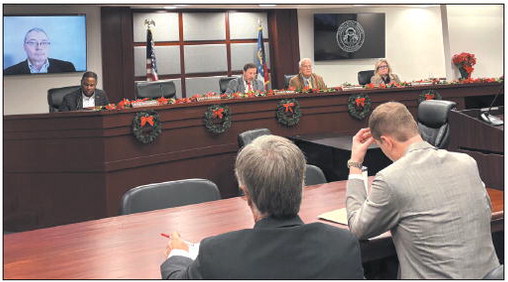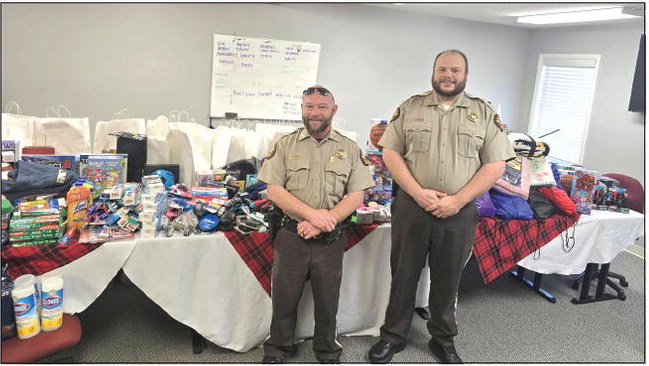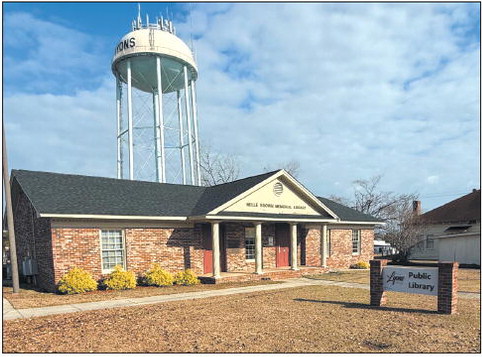Mayor Roper Reflects on Handling Helene Aftermath
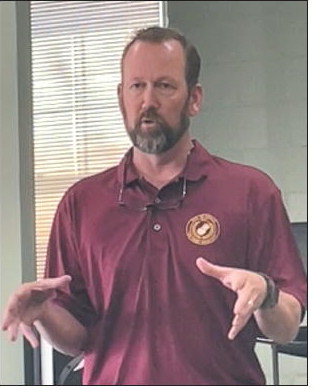

mrandolphadvance@gmail.com
Vidalia Mayor Doug Roper recently spoke to the Vidalia Lions Club on Monday, October 14, about how he and the leaders of Lyons and Toombs County worked to help the community recover from the devastation left behind by Hurricane Helene.
“As we all can relate, as the sun rose that Friday morning, what we encountered was something that none of us could have predicted or thought that we would see this far inland from a hurricane. To think that a Category 2 [hurricane] with winds of over 100 miles an hour would level our landscape and our power grid – I don’t know that any continued from page
of us ever thought that we would witness that,” Roper began, as he emphasized the severity of the situation.
After waking up to discover the damage, he said that he knew he had to get to work, but was unsure how, as he could not even communicate with fellow leaders. “From a leadership standpoint, what was absolutely crippling was the inability to communicate,” Roper stated. “I could not even talk to [City Manager] Josh [Beck] until later during Day 2. To do that, I had to drive to his house – dodge power lines, dodge downed trees – just so we could talk. So, it became very apparent that if the entities (cities, county, etc.) were going to be able to collaborate and talk, we needed an emergency operations center (EOC). We needed a place to rally and get together.”
To accomplish this, local leaders established a mobile command center at the Toombs County Emergency Management Agency (EMA) facility on Maple Drive in Vidalia, where officials spent days meeting, gathering resources, and making plans for how to survive and begin to heal from the disaster. “We lived there. I probably didn’t see my family for the first 8-9 days because I was working 16-18 hour days,” he remarked. “What we had to do, I believe, was push through the emotion. There is a lot of emotion that comes to play when you wake up that Friday morning to see this level of devastation in your community. We had to put that aside and very quickly prioritize day by day by day what our focal points were – what was most critical to bring to our community.”
According to Roper, the priority the first day after the hurricane was to make sure that citizens had access to water. “We can go without power; we can go without a lot of things for an extended period of time, but we had to figure out our water situation very quickly, and that is what we tackled on day one,” he shared.
The next day, the leadership team focused on safety, as they worked to deter looting, increase law enforcement presence, and clear roads. “We did have some looting. Storms or events like this will bring out the good in people, but it will also bring out the bad. We had nominal amounts of that, but I think that’s due to mutual aid that we received from the Georgia Bureau of Investigation (GBI), Department of Natural Resources (DNR), sheriff’s departments, and cities working together to strategically place law enforcement in town. So we mitigated that to the best of our ability,” Roper commented.
Day 3’s focus was fuel, as Roper reminisced on his mindset throughout the process. “I’m not talking about fuel to the public. [I mean] How do we get our hands on fuel to keep our first responders on the road? They are the ones providing the services and aid that the community needs. We were in trouble there for a while just having the fuel to keep ambulances on the road, to keep police officers on the road, to keep EMA (emergency management agents) on the road, and to keep public works on the road.”
Food was the objective for Day 4, which Roper said was achieved through a means that could have only been worked out by divine intervention. “When I tell you we had some God-sends, we had some God-sends. We had 3 different organizations – the United Cajun Navy, Angel Source Flights, and Dan’s Hurricanes Pals,” he explained.
The aid from the Unitcontinued from page
ed Cajun Navy came as a result of the lobbying of a lady who did not even live here, but was concerned for the area. “There was a lady from Peachtree City – did not even live here – who had come to the community to check on family. She reached out to me and said, ‘Y’all aren’t getting the attention that you need. I’m going to go back to Peachtree City, and I’m going to work on behalf of Vidalia.’ For days and days, she worked on behalf of us. She reaches out to me late one night and says, ‘I finally got through to [the United Cajun Navy], but they’re not sending aid until they talk to you.’” Roper called the United Cajun Navy representative late one night, and aid was immediately secured. “[When I call,] She quickly tells me what their organization does, then she asks me this: ‘Tell me what it’s like to be in Vidalia, Georgia, right now.’ I said, ‘Ma’am, the only thing I know to tell you is that every executive with Georgia Power that I talk to and every lineman I talk to who were boots on the ground at [Hurricane] Katrina tells me this is worse. We completely lost our power grid, we are having to rebuild over 3,100 miles worth of power line.’ She said, ‘We’ll be landing planes in Vidalia tomorrow,’” he recalled.
The United Cajun Navy brought 23 planes of aid the next day, and have helped to serve the area since. ‘That aid continued to show up and show up and show up,” Roper added.
This abundance of supplies led to the focus of securing volunteers and logistics to distribute goods on Days 5-6, and how to create distribution points on Day 7. “We had great needs, but we also had a great need for a base of volunteers to help us to distribute that aid,” he commented. Roper shared that several individuals stepped up to help organize the distribution points, including Phyllis Frederick, who he said was a cornerstone of the operation. “Phyllis Frederick – if you don’t know her, you need to know her. If you do know her, you need to hug her neck next time you see her because she is an absolute rock star. She ran that distribution center for us and did a fantastic job,” he told the club.
Days 8 and 9 were focused on continuing the morale and momentum of the work throughout the County. “I jokingly say Day 9 – how do we not all have a self-induced heart attack because 8-10 16-18 hour days can absolutely drain your cup,” he said.
Roper told the Lions that he had worked to boost the leaders’ spirits throughout the days because of the emotional and physical toll these long days had on each individual. He gave an example of a pep talk that he gave early in the first week of hurricane relief work.
Encouraging Fellow Leaders The mayor said that he told the leaders of a life lesson he learned early on that could now be applicable to the situation that they faced. “I had a very blessed career in baseball. I played collegiately and professionally, and played for some of the greatest baseball minds at the college level and professional level, but the single greatest lesson that I ever learned was what my dad taught me when I was 12 years old,” he emphasized.
He continued, “One night, we are in there working on ground balls, and I had fielded 150-200 ground balls without missing one, then the inevitable happens: I miss a ground ball. For me, at age 12, it wasn’t a big deal – but my dad stops and starts walking to me. He gets to me and says, ‘Doug, what happened on that ground ball?’ I do what most 12 year-olds will do, and come up with the first excuse that comes up in my mind. So, I say, ‘It took a bad hop.’ He looks at me and says, ‘That ball didn’t take a bad hop – that was a missed opportunity.’ The way that impacted and resonated with me in my life was huge.”
The truth in this life lesson was shown to Roper through three separate major events in his life, the Mayor said, the first of which was when he was a college sophomore playing baseball at Clemson University. “During my first at-bat of the season, I fouled the ball off my right leg, and broke it in 2 places. Season over. I had 2 ways to look at it: is it a bad hop or a missed opportunity? It wasn’t a bad hop – it was an opportunity for me to sit still and watch my teammates. I learned more in that calendar season that I probably did in all my other seasons and years combined,” he remarked.
The second instance came when he was playing professional baseball in the minor leagues when he was playing against a former teammate and was injured. “I get a base hit, knock in a few runs. I’m at first base thinking, ‘This is great!’ Next hit, I’m stuck in no man’s land and getting ready to break up the double play. The shortstop misses the ball and it gets into left field. I try to stay on my feet to take 3rd base, my right foot hits the base, and it explodes. I tore and did everything you can do to your ankle except break it. That’s the last time I ever put on a uniform – they carried me off the field in a stretcher,” he shared. “Bad hop or an opportunity? It was an opportunity for me to come back home and go to work at the Paul Anderson Youth Home. I was born and raised in a church, but that place is what taught me what it meant to have a personal relationship with Jesus.”
The third instance came later in life, on September 16, 2010, when Roper’s wife Marley was pregnant with their first child. The couple received some concerning blood test results and were referred to a specialist. “We go to the room, they put the wand on my wife’s belly, and there’s nothing. It doesn’t dawn on me – I think it’s muted. The technician knew something was wrong and picks up the phone and gets the doctor back in the room. He does a couple of things, then looks at my wife and says, ‘Marley, I’m sorry to tell you but your baby has died.’ Bad hop or an opportunity? It was an opportunity that I understood in that moment that I am absolutely in control of nothing. God walked with us through that like He had never walked before.”
He continued, “So, my challenge to the group that morning was this: is this storm a bad hop or an opportunity? It’s an opportunity that even though we were not getting the coverage that I think we deserved, we had a chance to continue to show the world how you respond in the face of adversity. This storm didn’t come with a manual; it took a war-room type setting with municipalities working together to serve our community.”
According to Roper, the biggest challenge which the leaders faced was to avoid getting overwhelmed by the damage and tasks at hand. “The trap was for us to get overwhelmed. The trap was to look at the devastation, know that it doesn’t come with a manual or playbook. We just went to work. God’s word says, ‘Come to Me, My yoke is light.’ He was sending us the resources that we needed, and we had one mission – and it’s easy – keep serving people,” he remarked. “All we had to do was serve people. God was sending us the resources – we just had to be strategically ready to displace them and redirect them. That’s all we could do. He has been taking care of us, we’ve just been receiving and distributing.” Sharing His Personal Experience The mayor also shared his own personal experience with the storm and the spiritual lesson that it taught him.
Roper said he was standing in the kitchen with his wife on Thursday evening prior to the storm’s arrival, when he felt something tell him to go outside. “I hear the Holy Spirit say, ‘Prayer walk.’ So, I look at Marley and I say, ‘I’m going to do a prayer walk around the house,’” he recounted. “I literally go outside – I am walking around my house praying out loud. My prayer was simple: ‘Lord, will You please literally let my footsteps be a hedge of protection around my home. Will You please protect my home and will You protect my family. I know things are going to get rough, if things fall, will You let them fall outside of the circle and not inside of the circle.’” The family went to sleep that night, as their 8 year-old son slept on an air mattress within the center of the home, and Marley and the couple’s 11 yearold son fell asleep in the master bedroom. Yet, this peaceful slumber ended after Roper looked outside as the storm blew through. “At 2:30 a.m., I walk outside of our French doors over our covered patio – that’s when I realized [Helene] means business; she’s packing a punch,” he said.
Roper woke his oldest son and wife up and told them to move to the hall for safety, so that they would not be sleeping near any trees. “We are huddled up and have no power. The wind was deafening, and you could hear the trees snapping. My oldest son looks me dead in the eyes and says, ‘Daddy, are we about to die?’ And I said, ‘I don’t know. The only thing I know to do in this moment is to pray,’” he shared.
The reality of the situation hit as the family went outside after daybreak. “There is no way I can describe it – you’ve seen it for yourselves. But for me, it was almost like I stepped back in time to what Hiroshima or Nagasaki would have looked like. It literally looked like a nuclear bomb went off at the house,” Roper emphasized. “As we walked around my house, a massive pine tree missed my little boy’s room by feet – but it fell outside the circle. A massive tree had missed my garage by feet – but it fell outside the circle.”
In fact, only one thing penetrated the circle: a sign that was found on the garage floor. “It’s the only thing that came inside the circle that we didn’t own prior to the storm. It’s not mine, I’ve never seen it before, and I don’t know where it came from. It is about the size of a political sign, and it says, ‘Vote Jesus Always and Forever,’” he told the Club. “We lost 100 trees that didn’t hit my house, and the only thing that came inside the circle was Vote Jesus Always and Forever.”
Roper said the storm has made a lasting impact on his family, and that he plans to frame, sign, and date some of the wood that fell on his property as a reminder to the family. “This is my message to my boys: ‘Every time you walk by that sign, I want you to remember two things: the strength of that storm and the strength of the wind, and that it pales in comparison to the power of prayer.’” Where We Are Today
When discussing the current status of debris clean-up and hurricane relief efforts within the area, Roper stated that three decisions had set the area up for success: who the city hired to remove the debris, the monitoring group that we hired to monitor debris monitors (which you have to do), and a third person that was hired to help us with documentation for FEMA reimbursement.
“There are going to be a lot of silver linings that come out of this when we get on the other side of it,” he emphasized. “My message to the community is this: this storm may have permanently changed our landscape, but it will not change our resolve or the fabric of who we are.”
Roper concluded his speech by complimenting Vidalia Lions Club Member and City Manager Josh Beck on his work throughout his tenure with the city. “Prior to this storm, I feel like we were doing a lot of good things in this community. We were moving and project heavy – we had some really, really good things going on. No decision that we have made has been better than hiring Josh Beck as our city manager. He’s been a rock and is level headed. If I’m going to be in the trenches with anybody during this, I want to be in the trenches with him,” he emphasized.
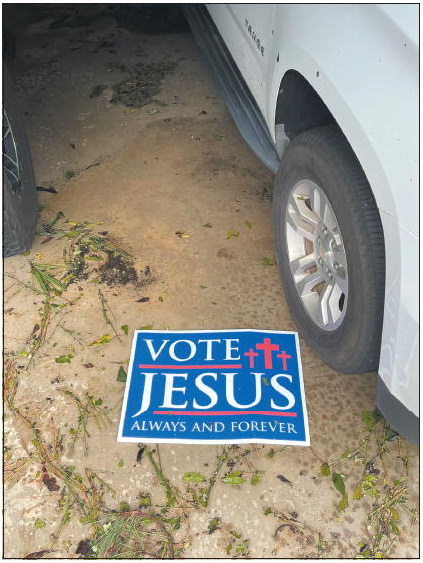
PENETRATING THE CIRCLE – This sign was the only thing to penetrate the circle in which Roper had walked during his prayer walk.




